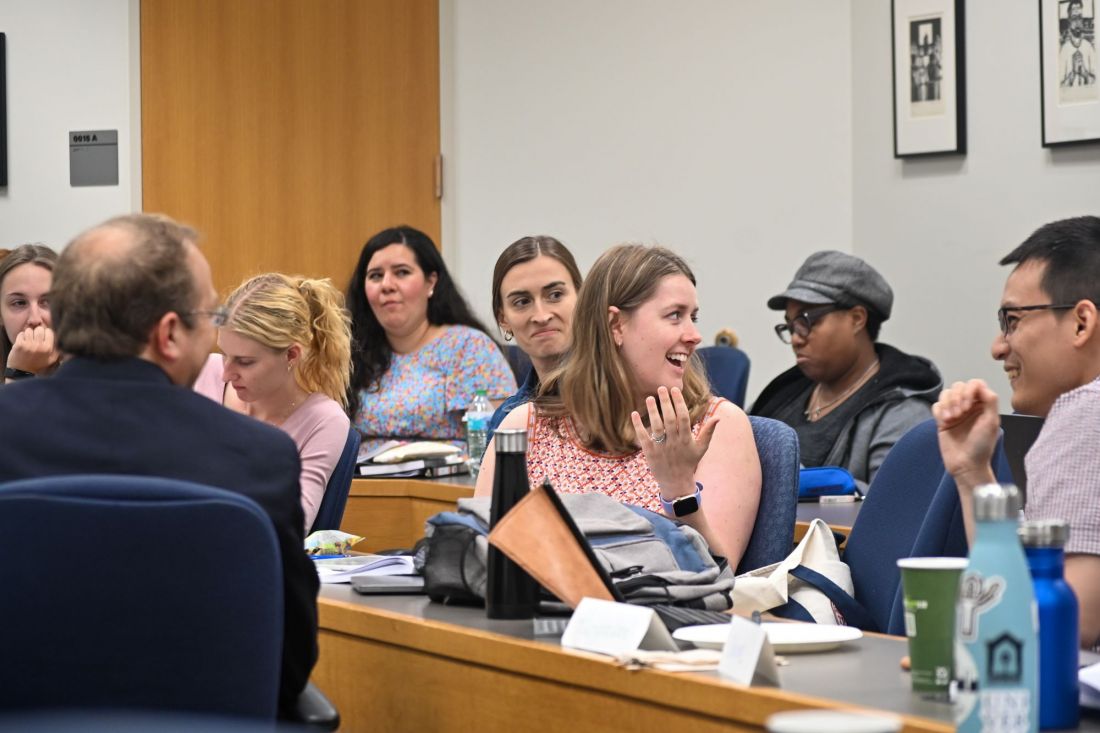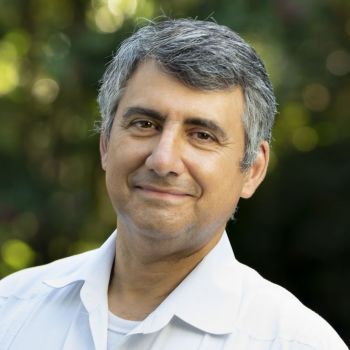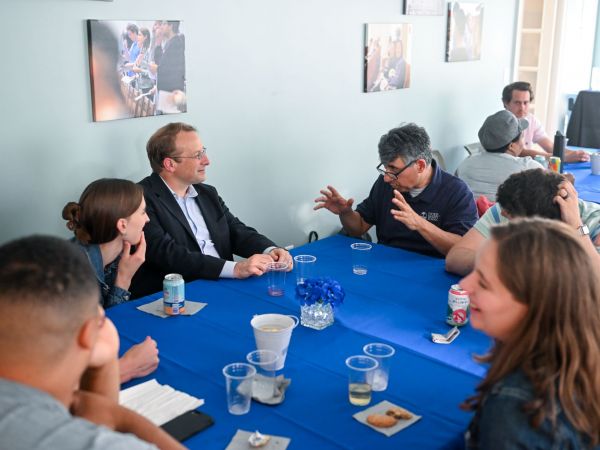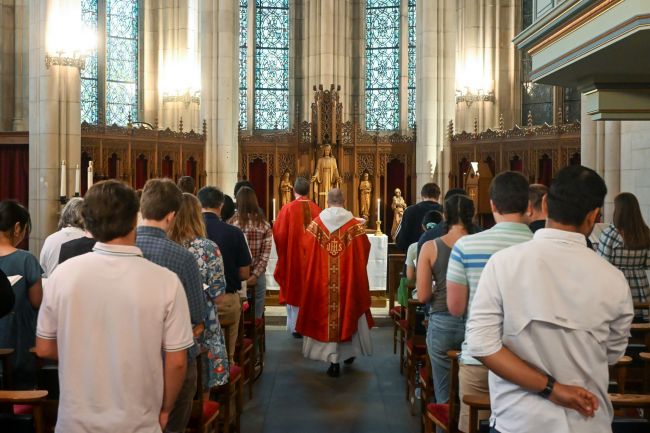
Two weeks after Pope Francis addressed leaders at the G7 summit on the promises and perils of artificial intelligence, 15 graduate students and young professionals gathered at Duke University for a seminar June 23–29 on “Artificial Intelligence, Ethics, and Catholic Thought.”
Coming from more than a dozen universities and companies across the country, the students were guided by faculty from Duke and the University of Virginia as they delved into topics ranging from ancient philosophies of technology to how artificial intelligence (AI) is shaping human relationships today.
“You have this techno-apocalyptic view of Elon Musk and Mark Zuckerberg building these underground bunkers, and it's really a part of the milieu in which we live,” said Chase Mendoza, a seminar participant and graduate student in political science at the University of Notre Dame. “So, I wanted to understand what the Catholic tradition has to say about technology and how we navigate technology.”

“In the Pope's address to the G7 over the summer, he talked about AI as a fascinating instrument: It could be a tool to help humanity and we can have a politics that would guide us, or it could be very destructive for humanity. Fons Vitae has to deal with these current events that affect our daily life but drawing upon wisdom from the deeper philosophical, theological, and intellectual traditions represented by Catholicism.”
The seminar students explored contrasting views of artificial intelligence. For example, in one account AI is a tool that can be used for good or ill, while in another AI is embedded in a utopian worldview that misunderstands human dignity.
“These are the issues that this generation is going to have to deal with, so it is important to help them develop the resources that they need to develop and regulate these tools responsibly,” said Paul Scherz, associate professor of Religious Studies at the University of Virginia, who led the seminar and has since been appointed as the Our Lady of Guadalupe Professor of Theology at Notre Dame. “I found the experience really helpful to my own thought on these topics.”

Presented by Duke Divinity School’s Fons Vitae initiative, the seminar was organized by Peter Casarella, professor of theology at Duke Divinity School, with support from the Lumen Christi Institute. Fons Vitae seeks to deepen the Catholic intellectual presence at Duke University and regional communities through engagement across academic and professional disciplines.
“In the Pope's address to the G7 over the summer, he talked about AI as a fascinating instrument: It could be a tool to help humanity and we can have a politics that would guide us, or it could be very destructive for humanity,” Professor Casarella said. “Fons Vitae has to deal with these current events that affect our daily life but drawing upon wisdom from the deeper philosophical, theological, and intellectual traditions represented by Catholicism.”

The readings for the seminar ranged from theological works by Thomas Aquinas, Pope Francis, and Alasdair MacIntyre to essays in philosophy and the social sciences by Alan Turing, Sherry Turkle, and Marshall McLuhan.
“I have a better understanding of theology and philosophy as it relates to ontology and phenomenology and axiology around AI as well as concepts of personhood and a richer sense of human dignity,” Eyram Klu said about what he learned through the seminar. Klu came to the program as a professional working in the artificial intelligence cybersecurity practice of the consulting firm Accenture while also pursuing a master of arts in liberal studies at Duke. “That's helped me to be able to figure out what classes I need to take next.”

In addition to professors Scherz and Casarella, six other Duke faculty and staff contributed to the seminar with expertise ranging from theology to literature to data science. In one discussion session, Professor Reinhard Huetter, visiting professor of Catholic theology at the Divinity School and a member of the Vatican’s International Theological Commission, presented a substantial draft paper on AI and human dignity. In another session, Professor Michael Pencina, director of Duke AI Health, and Matthew Elmore, Th.D., the AI ethics and evaluation specialist at Duke AI Health, led a conversation on their work developing policies for the implementation of AI at Duke Health.
“It seems that the consensus that we came to as a group is AI can be good; it just needs to be designed better and designed with human flourishing in mind,” said Louisa Conwill, a graduate student in computer science at Notre Dame. “And that's exactly what I'm trying to do in my work.”
The most visible event of the seminar was a program titled “AI, Human Flourishing, and Truth in Health Care,” with a keynote address by Duke English professor Thomas Pfau and responses by Pencina, Elmore, and Gilbert T. Rowe Distinguished Professor of Christian Theology Norman Wirzba from Duke Divinity School. Approximately 70 people attended the program at the Washington Duke Inn, with another 50 joining via livestream. (Watch a recording of the address and responses.)
One of the seminar participants, Avery Smith, a lecturer at Loyola University Chicago who is pursuing a master’s degree in theology, was struck by a point made by Professor Wirzba about the intersection of ethics and technology.
“AI is energy hungry,” Smith said. “And so there's going to be a point where we're going to have to decide between cooling and heating our homes and having food versus providing energy for AI.”
“Things that I'll keep thinking about are the relationship between artificial intelligence and how it impacts the way we view ourselves and the way we view other people,” said McGrath Bissaillon, a graduate of Duke Divinity School who works for the accounting company PricewaterhouseCoopers. “Finally, there’s the impact AI will have on our perspective on what it means to live a good life.”

In addition to classroom conversations and academic talks, the seminar offered daily Mass and times of fellowship over meals and at a Durham Bulls game.
“I loved how diverse our group was,” said Berit Guidotti, a doctoral student at Boston College researching technology and ethics. “I think having people who are in academia and also practitioners and technologists in the room was really, really helpful.”
“What I am bringing forward the most is that I feel hopeful,” Guidotti said. “I'm looking forward to seeing the seeds that have been planted this week grow in everyone's domains of life—I don’t think the conversation is going to end here.”